The article was updated on December 16, 2021.
A newly-sprung branch of fintech, insurtech is now gaining wider adoption. Driven by the customer demand for simple, fast, and competitively-priced insurance, the market for insurance apps is predicted to reach $164.13 billion by 2023.
Despite the incessant COVID-19 concerns, insurers, in general, are optimistic about future industry growth and are embracing digitization. As the insurance industry becomes more reliant on technology, the goal lies in making apps for insurance more customer-centric.
Read on to learn all you need to know about the features of an insurance app and other basics of insurance app development!
Why your insurance company needs a mobile app
Admittedly, the insurance business has become more challenging than a decade ago. The risks have become less predictable and more diversified. The volatility of markets, climate change, and the challenge surrounding the pandemic are making it harder to assess risks in a proper manner.
Other issues faced by the insurance companies include the following:
The need to make sense of vast amounts of data
Insurers now have access to data from a number of different sources, to the point when it becomes difficult to decide which data is relevant. The flow of information is overwhelming, and companies need robust analytics systems to transform it into meaningful insights.
The customer demand for the seamless experience
Customers feel that buying insurance is not ‘fun’, and are looking for better and more satisfying experiences. Because they file insurance claims at some of the most stressful moments of their lives, they also need communication with their insurance companies to be as seamless and convenient as possible.
The business demand for acceleration and efficiency
A lot of processes are still done manually and there’s lots of paperwork. Insurers are in dire need of accelerating underwriting and claims processing while maintaining accuracy and efficiency.
In this regard, insurance software is now more than a popular fad. Apart from connecting insurers to customers, mobile apps for insurance help companies take their services to an entirely new level by improving a number of processes.

Benefits of insurance apps
Processing insurance claims
A mobile app enables customers to send insurance claims instantly, accompanied by photos taken right after the accident. Because claims are submitted digitally, insurers are no longer bound by paperwork, which lets them process more claims over a particular time span and focus on building customer relationships.
Data-driven underwriting
Digitization enables insurers to adopt an entirely new approach to insurance underwriting. Instead of analyzing the client’s age, demographics, and credit history, a car insurer, for example, can now analyze a person’s driving behavior. The amount of insurance will be based on accurate information about how safely they drive.
Optimization of sales
Software for insurance agents enables them to work on the go and communicate with their offices even while they travel. Integrations with CRM software allow them to instantly enter customer-related data into a sales database and gain insights from it.
Deal conclusion
Nowadays, insurers risk losing customers, if they fail to conclude the deal on the same day. People will no longer wait for the final decision. Instead, they may turn to competitors. Software solutions for the insurance industry help quickly process vast amounts of data and accelerate the conclusion of insurance agreements.
Types of mobile insurance apps
Insurance software solutions can be subdivided into two categories: apps for consumers and insurance management software for insurance companies. Normally, insurance business needs both an internal and a customer-focused software platform accessible from a mobile device or from the web interface.
Below is a brief overview of the existing types of insurance apps.

Apps for consumers
People are buying insurance to safeguard their lives, property, vehicles, and health. Some insurance policies are also used to secure business assets and protect companies from risks. The types of insurance mobile apps listed below are covering each of these important aspects.
The most widespread types of mobile insurance apps for consumers include
- life insurance apps,
- health insurance apps,
- car insurance apps,
- apps for travel insurance,
- homeowner insurance apps,
- small business insurance solutions, etc.
P2P insurance apps are also a growing insurtech niche. These solutions connect groups of individuals who join their assets to protect each other against risks. An example of a peer-to-peer insurance app is Lemonade, a digital solution enjoying immense success in the United States.
Solutions for insurance businesses
Other types of software solutions are targeted at the organizations operating in the insurance segment. These mobile apps for insurance companies help employees get in touch with customers, analyze data and streamline routine processes:
Apps for claims settlement
An insurance management software connecting insurers to clients. Apps for claims settlement help quickly assess claim-related data, enabling a decision to be made within minutes after a user files a claim.
Apps for insurance brokers
A mobile app for insurance agents enables them to manage the sales process, collect information about clients and their behavior patterns. Integrated with a CRM, this software helps effectively communicate with clients and boost sales.
Mobile insurance agency software provides a means for insurers to manage company operations on the go, saves time, and significantly reduces the risk of human error. Insurance companies may also benefit from implementing the following solutions:
Apps for managing policies
This type of insurance software offers employees a way to manage and create insurance policies in a secure and automated way.
Underwriting tools and solutions
For insurance companies, underwriting is a critically important process involving the evaluation of risks an organization bears in insuring the health or property of a policyholder. Underwiring software helps insurers accurately assess risks and avoid human error.
ERP software
ERP applications for insurance firms help track important metrics such as transactions data, legal data, etc. Along with CRM software, ERP solutions help ensure the efficiency of company operations.
Top features for insurance software
For entrepreneurs contemplating insurance software development, we have prepared a comprehensive list of features that users expect to see in an insurance app.
These features are absolute must-haves, although you will surely have to enhance your app with unique functionality that will differentiate you from competitors.
Basic features of an insurance app
Profile
A profile of a consumer-focused insurance app should contain correct and relevant information about a person or an object that customers want to safeguard.
If it is health or life insurance, for example, a user should provide the necessary personal details. A car insurance app profile should contain information about a vehicle and its condition.
Info on insurance policies
A user should be able to view the details of their insurance policy in an electronic format. Customers should also be able to access information about other insurance policies offered by a company.
If a company offers a wide range of policies, users will surely appreciate automated recommendations, tailored to their income and background.
Quotes
The insurer will decide which type of insurance to offer, based on the info submitted by a customer. Viewing a selection of the available insurance policies with quotes can help a customer consider the available options.
Submitting a claim
Filing an insurance claim is a core feature that your users will expect from an insurance app. Your customers should be able to submit a claim immediately after the insured event takes place.
If it is a vehicle or property insurance, an app should enable users to take photos and upload documents confirming the harm and damage.
Payment gateway
A payment system built into an app will enable customers to submit payments directly from an application interface. Better still, insurers could introduce automated payment features for regular annual or monthly insurance fees.
Notifications
After submitting a claim, users should be able to get notifications about the stages of the claim settlement process. Knowing how the claim processing goes helps customers alleviate anxiety and build trust.
Customer support
Users should be able to contact customer support in case they are experiencing issues or need help understanding the details of their insurance policies. In this regard, integrating an AI chatbot to help answer typical customer questions may be an excellent idea.
These are the basic features that most customers are likely to expect from an insurance app. If you need company software for insurance management, it needs to have distinctly different functionality.
Of course, the set of functions will ultimately be dictated by your organization’s structure and business demands; typically, though, mobile apps for insurance agents should include the following features.
Features of apps for insurance agents
Registration/Signup
Insurance brokers should be able to quickly and easily register accounts and access their profiles when necessary.
Agent profiles
A profile should contain not only contact details of an insurance agent, but some personal information.
List of policies
Similar to a client’s app, the software for insurance agents should contain in-depth information about all the insurance policies offered by the company.
Claims status and history
A user should be able to view the claims in progress and the history of resolved claims.
Notifications
This feature will send users alerts about the new claims and status of pending claims.
Customer info
Each agent should have access to client profiles, be able to view the history of previous claims and how they were resolved in order to gain insights into any documented customer behavior.
The admin panel
The admin panel will serve as a single entry point for viewing information on both customers and agents. It should offer dashboards for insights into company operations, and other tools for managing your insurance agents.
Niche-specific insurance software features
The must-have insurance app features will also differ depending on the insurance niche.
- A car insurance app, for example, should include a geolocation feature for detecting the exact spot where the accident occurred. It should also integrate with GPS or Google Maps to help drivers locate a gas or service station nearby.
- A health insurance app might include the ability to schedule an appointment with a physician and search for prescribed medications in nearby pharmacies.
- A travel insurance app may contain flight status updates and other essential features for travelers.
Real-life example
Probably one of the most innovative insurance providers, Allstate, offers a full-featured online portal and a wide range of mobile applications. Its website provides such capabilities as online quotes, finding local agents, the ability to file or track a claim, personal account, and exhaustive information on various aspects of the company’s business.
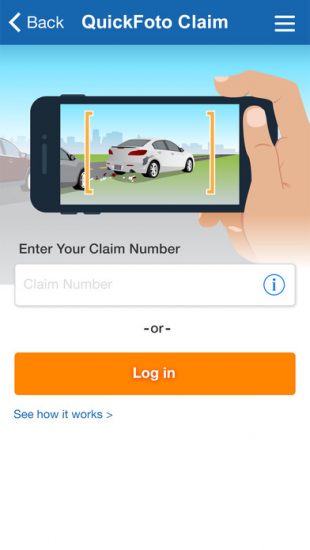
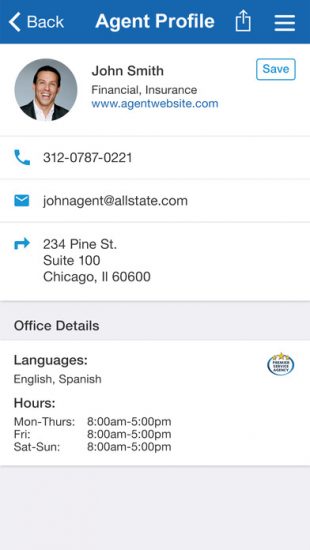
Its main mobile app, Allstate℠ Mobile, is basically a mobile, simplified version of the company’s web portal. It comes with the ability to set up scheduled payments, submit photos of the damage that a claim is being filed for, contact appropriate emergency personnel, and a number of other useful features such as parking or a gas station locator.
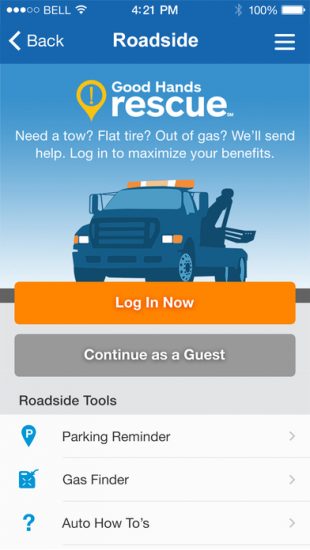
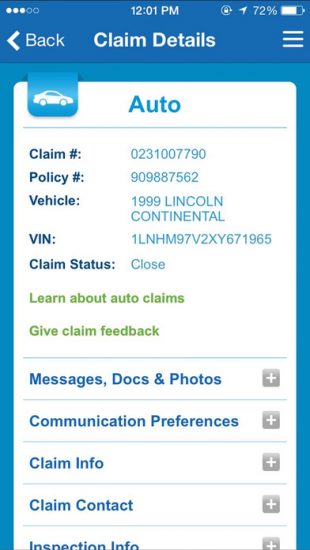
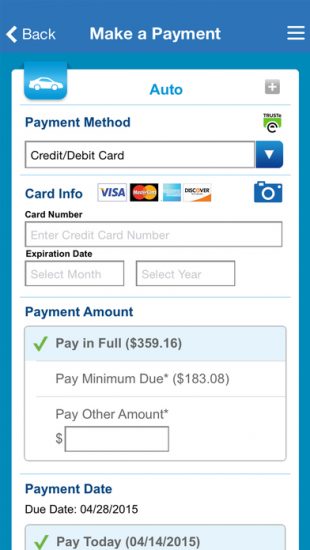
Trends in insurance application development
As technologies become more advanced, the trends in insurance application development tend to gravitate towards personalization, acceleration, and customer-centricity.
Below is the list of the hottest insurtech trends for 2021 and beyond.
AI-driven claims processing
Insurers increasingly use AI to accelerate the processing of insurance claims and to ensure that customers get responses within minutes.
Insurance apps use chatbots for immediate claims processing and AI algorithms for the prioritization of claims. Acceleration allows insurers to process more claims, lower insurance prices, and get ahead of competitors.
IoT integration
IoT devices such as smart home systems and wearable fitness trackers have already become commonplace. For insurers, the use of IoT opens a doorway to a better understanding of risks and precise pricing of risk policies.
Vehicle sensors, for example, help monitor driving behavior, and fitness sensors help assess the existing healthcare risks.
Predictive analytics
Another trend is towards using predictive analytics to understand how customers are likely to act, identify risks of cancellation, and fraud.
Also, predictive modeling enables insurers to prepare for future claims and estimate what impact the probable situation may have on their business.
Gamification
Introducing the element of gamification into an insurance app to encourage customers to take a desirable action. Gamification also helps insurers build better relationships with customers or educate them about living healthier lifestyles and driving safety.

Final thoughts
When it comes to insurance services, customers tend to have high expectations, which include personalization, fast claims processing, and a seamless digital experience. The rise of embedded insurance driven by the development of fintech and insurtech has also widened the scope of competition for the insurance industry players.
To stand up to these high demands, companies have to offer fast, convenient, and affordable services via web and model channels. A reliable tech partnership could help insurers enhance their business with digital solutions and tools, boost revenue and expand their customer base.
At Eastern Peak, we know how to develop an insurance app that will meet the unique needs of your business and customers. Looking for mobile insurance app developers? Contact us now for a free consultation!
Read also:



